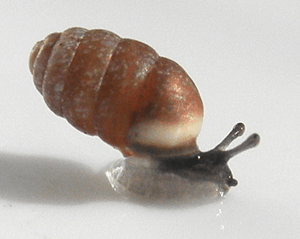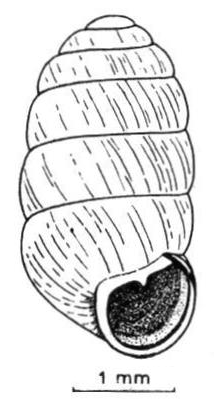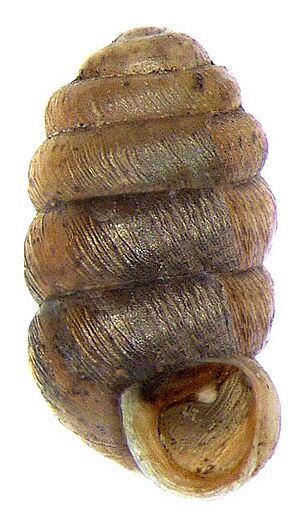Moss Chrysalis snail facts for kids
Quick facts for kids Moss Chrysalis snail |
|
|---|---|
 |
|
| A right side view of a live Pupilla muscorum | |
 |
|
| Six shells of Pupilla muscorum, scale bar in mm | |
| Conservation status | |
| Scientific classification | |
| Synonyms | |
|
The Pupilla muscorum, also known as the Moss Chrysalis snail or widespread column, is a tiny land snail. It is a type of mollusk that breathes air and lives on land. These snails are so small that they are sometimes called micromollusks.
Contents
Snail Families and Names
Scientists group living things into families. The Pupilla muscorum belongs to the Pupillidae family. Its scientific name was first given by Carl Linnaeus in 1758.
Another snail, Pupilla muscorum var. pratensis, was once thought to be just a different type of Pupilla muscorum. But in 2009, scientists decided it was a separate species called Pupilla pratensis.
What Does This Snail Look Like?
The shell of the Pupilla muscorum is usually light brown. It can also be reddish-brown or grayish. The shell is mostly smooth or has very faint lines.
It has about 5 to 6.5 whorls, which are the turns of the shell. These whorls are slightly rounded. The line where the whorls meet, called the suture, is not very deep. This is different from a snail like Pupilla sterrii, which has deeper sutures.
The opening of the shell, called the aperture, usually has a strong lip around it. There is also a strong ridge inside the shell near the opening. Sometimes, there is a small tooth-like bump inside the opening.
The Pupilla muscorum is different from Pupilla pratensis in a few ways. Its shell is usually thicker, smaller, and more slender. It also has a lighter and more varied color, and a stronger lip around its shell opening.
The snail itself is small and oval-shaped. It is dark with lighter sides and a lighter foot. Its upper tentacles are not very long, and its lower tentacles are very short.
These snails have looked almost the same for a very long time. This means they have lived in similar environments throughout history.
The shell is usually about 3.0 to 4.0 millimeters tall. Its width is about 1.65 to 1.75 millimeters. The width does not change much between different snails.
Where Do These Snails Live?
This snail lives in the Northern Hemisphere, including almost all of Europe. You can find it in many countries and islands, such as:
- Great Britain: Here, it faces challenges because old grassy areas where it lives are being changed.
- Ireland
- Austria
- Germany
- Czech Republic
- Slovakia
- Ukraine and Crimea
- Pakistan
- Parts of the United States, like Michigan, Utah, and Vermont.
Snail Habitat and Life Cycle
Pupilla muscorum likes to live in dry meadows, sand dunes, and other open, sunny places. It prefers areas with lots of calcium, like limestone. In Portugal, you can find it under stones, dead leaves, and in mosses. In Britain, it is common in calcareous grasslands where sheep graze. In the Alps, it can live at very high altitudes, up to 2400 meters.
These snails are ovoviviparous. This means they keep their eggs inside their body until they are ready to hatch. They can even hibernate (sleep through winter) with their eggs inside. Then, when the weather is better, they can release eggs that already have partly grown babies inside.




